I always thought that The Last of Us was an overrated video game. It was good, sure, don't get me wrong. But I never thought that it was the "pinnacle of story-telling in gaming", as many of its biggest fans suggested. To me, it was a good zombie story about the risk of closing ourselves off from each other, which was stapled to a good cover-based shooter. But, to me, the whole always felt like less than the sum of its parts. The gameplay of The Last Of Us was always more about setting a tone than about telling the story. And if your gameplay isn't helping to tell the story, then, as far as I'm concerned, you're not a particularly good example of the interactive video game medium.
So when HBO announced that it would be producing a TV mini-series adapting The Last Of Us, my initial reaction was "why bother?". Like with so many modern remakes, reboots, and adaptations of barely 10-year-old media, I felt like the original is fine, and if you want to watch a Last Of Us movie, you could just hop on YouTube and watch a compilation of all the cutscenes. Honestly, you wouldn't be missing much by ignoring any of the actual game -- let alone by not playing it yourself.
Very little of The Last Of Us' gameplay informed the story in any meaningful way.
Well, HBO's streaming series manages to simultaneously vindicate that feeling, while also showcasing that The Last Of Us does actually benefit from being adapted into the medium that it was always better suited for anyway. The creators of the video game, themselves, in adapting the game, basically cut out all of the actual video game. Virtually nothing that the player ever has to do in The Last of Us was translated to the TV show. It's as if all the actual video game was never really important at all to telling the story. The TV show basically adapts all the cutscenes, telling the same basic story -- sometimes better than the game did -- and without all the meddlesome video game getting in the way.
In the entire 10-episode mini-series, there is [I think] two scenes of our characters having to sneak past infected -- one of which is a flashback. And not a single one of the multitude of scenes in which Joel and Ellie are ambushed by random raiders is adapted at all. Seriously, the characters keep talking about how dangerous it is outside of the quarantined cities because of raiders, but yet we never once see any actual raiders. The closest we come is the ambush by the revolutionaries in Kansas City. Then there are a couple scenes of Joel and Ellie getting ladders or unlocking doors for each other, which was about the only part of the game that ever contributed to the story-telling by reinforcing the relationship and growing inter-dependence of the characters.
Under most circumstances, I would say that adapting a game by cutting out so much of the game would be a "bad thing". In this case, however, it isn't. It might actually be an improvement. I always felt like the bulk of the gameplay in The Last Of Us was just filler anyway. All the actual story -- all the stuff that everybody remembers and loves -- happens outside of the player's control.
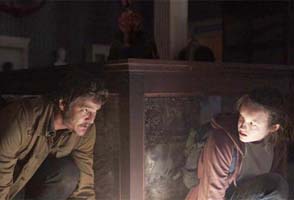 The Last Of Us Episode 2, © HBO, Sony Television.
The Last Of Us Episode 2, © HBO, Sony Television.
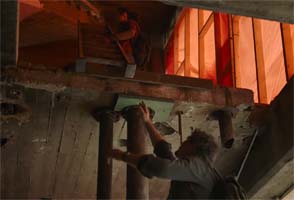 The Last Of Us Episode 9, © HBO, Sony Television.
The Last Of Us Episode 9, © HBO, Sony Television.
Very little of The Last Of Us' gameplay was adapted into the TV show.
The growing fungal threat
The TV mini-series doesn't only cut gameplay content out; it also adds quite a bit new story, and changes things here and there. There are a lot of flashbacks to the days before the outbreak, and to the early days of the outbreak. These serve to provide additional characterization for Sarah, in order to make her a more fully-fleshed out character. It also provides backstory regarding the origin of the mutated cordyceps, and why Ellie is immune.
When The Last of Us released back in 2013, the idea of a cordyceps apocalypse was kind of laughable. Fungi can infect insects, but they cannot survive in the warmer bodies of mammals. The worst that humans have to worry about is topical infections like athlete's foot or yeast infections.
However, as the show points out in its opening minutes, there is actual growing concern from infectious disease experts that climate change could actually cause fungi to become a serious infectious hazard to humans. The reason for this is that the rising temperatures of the Earth (due to human-induced climate change) is causing many fungal species to adapt to warmer temperatures. Even just adding a couple extra degrees of temperature tolerance would be enough for certain fungi to survive in the warm-blooded bodies of mammals and cause serious illness. Cordyceps would need a lot more mutation than just a couple extra degrees of temperature tolerance in order for it to become a threat to humans, but other fungi (such as the yeast Candida Auris) have already begun causing serious illness to humans. [More]
0d94fce5-da5d-42fb-b476-9fdd748b75d8|5|3.6
Tags:fungus, The Last of Us, HBO, HBO Max, streaming television, Pedro Pascal, Bella Ramsey, Nick Offerman, zombie, cordyceps, fungus
Fanboys have been demanding it for years, and now, finally Warner Brothers has seen fit to grace audiences with a version of Zach Snyder's original vision for the Justice League movie. And you know what? It's actually not that bad.
I would have been much less tolerant of the movie's 4 hour runtime if I had been stuck having to sit quietly and watch it in a theater. Being able to watch it at home, on the comfort of a couch, with friends, and able to stop to go to the bathroom or take a snack break, really helped to make the movie feel like less of a drag than it otherwise might have.
Zack Snyder's Justice League is 4 hours long, but is a much better movie than the theatrical cut.
Heck, the movie almost seems designed for audiences to get up a few times to take a break and maybe even chat about what's going on. The movie is broken up into 5 or 6 "parts", with each part beginning with a title card showing a name for the part. It's essentially divided up into 40-ish minute episodes as if it were a TV mini-series.
As such, each character gets time to shine. They all get more development, and they all have a unique role to play in the final confrontation. The whole conflict isn't just won because Superman shows up. Each of the other characters still has to do their part. Well, the heroes all get meaningful roles. Louis Lane still feels like she could have been cut from the movie entirely and it wouldn't make a difference, even though she's supposedly the key to preventing the disastrous future that keeps showing up in Batman's dreams.
Doing good for the sake of good
Perhaps most importantly, the heroes in this movie feel a little more like the heroes that we know from the comic books, even if they are still darker, edgier, and exceedingly grim and emo all the time. Unlike in Man of Steel and Dawn of Justice, these depictions of Superman, Batman, and so forth actually seem to care about everyday people, and we have multiple scenes of some of them going out of their way to fight crime and save lives. Better yet, their selfless acts are not depicted as being done as a begrudging obligation that they'd rather not be bothered with. These heroes actually do good for the sake of doing good. They also don't spend the whole movie bickering with one another, let alone indulging in the petty conflicts or dick-measuring contests presented in Dawn of Justice.
The heroes act more like heroes.
It's impossible to know how much of this was originally part of Snyder's vision at the inception of the DCEU, or if it was course-correction based off of feedback of Man of Steel and Dawn of Justice, but Snyder's Justice League is surprisingly lighter in tone than either Man of Steel or Dawn of Justice. But not to the point of self-parody that was present in Joss Whedon's re-shot mess of a film. [More]
80eed31e-fd22-46ea-91f5-cc1aeb63cabc|1|5.0
Tags:Justice League, Zack Snyder, Warner Brothers, HBO, streaming, DC Comics, Superman, Batman, Wonder Woman, Aquaman, Flash, Cyborg, Steppenwolf, Darkseid, The Snyder Cut
George R.R. Martin has yet to finish writing the book series.
Let HBO's Game of Thrones series stand as a testament to why companies should not adapt works for television or movies until after that work is actually complete. Game of Thrones was a huge hit when it premiered, and its early seasons are among the best television in recent memory. However, the last two or three seasons have been ... less good. The writing has become more spotty, characters are behaving more impulsively, the pacing has been rushed, and the whole thing just seems to be less well thought-out.
This could be due, in large part, to the fact that after the fifth or sixth season of the show, showrunners David Benioff and D. B. Weiss have advanced beyond the source material. George R. R. Martin has yet to finish writing the final two books in the series -- a process which may still take years! HBO didn't want to wait, and they continued on with the show despite the lack of established source material from which to pull. They've done so with the consent and advice of Martin, who supposedly provided Benioff and Weiss with an overview of what he wanted to write in those final two books, but the end result has been sub-par.
I've written previously about the show's fifth season, which is the last season of the series that I would consider to be "good". That season was criticized for being "slow and boring" by some, and also for using shock value (such as the rape of Sansa by Ramsey Bolton) as a gimmick to keep people interested. However, I thought that the fifth season was tightly unified by its consistent themes of futility and self-destruction, as each of the major players slowly succumbed to their most fundamental impulses and took actions that ended up undercutting their own goals.
Season five had a consistent theme of self-destructive leaders.
Seasons seven and eight, however, have been much less defensible.
Season seven cut the episode count from the usual ten down to only seven, which resulted in the season as a whole feeling rushed and under-developed. Characters began to act more rashly, with little attention paid to building up to those actions. They travel great distances in what seems like no time at all. Plot threads would be left dangling, or would be set up and never paid off.
The Unsullied were left at Casterly Rock with no supplies,
only to show up a few episodes later no worse for wear.
For example, mid-way through the season, the Unsullied Army travels to Casterly Rock to fight the Lannister army, only to find that the Lannisters have abandoned the castle, destroyed the grain reserves, and salted the land. The episode makes a big deal of the fact that the Unsullied are now stuck there with no provisions and no hope of receiving reinforcements or supplies. Then we don't see or hear from them for, like, two episodes, before they suddenly show up again at Dragonstrone no worse for the wear.
Season eight seems to have doubled down on most of these problems. The season has been reduced further to only six episodes, and events are happening with even less build-up or set-up. Scenes are being added for shock value without any rhyme or reason. Characters are behaving out of character, or suddenly having changes of heart at the flip of a switch. Characters who used to be clever are acting like bafoons.
... [More]
54ba5529-dd1d-4888-9565-e0e4c0842572|1|4.0
Tags:Game of Thrones, HBO, Home Box Office, streaming television, George R. R. Martin, A Song of Ice and Fire, novel, Iron Throne, Cersei Lannister, Daenerys Targaryen, John Snow, Arya Stark, White Walkers, dragon, winter, King's Landing, Winterfell, Mary Sue
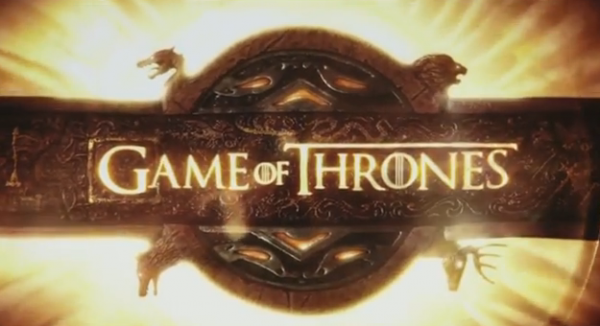
I recently wrote an analysis of Game Of Thrones' fifth season. I had originally planned to include some speculation about the sixth season, but it wasn't really relevant to the point of the article, which was to describe the themes present in the season. So for the sake of brevity, I moved that speculation to a new post.
What season five does very effectively is to blur the lines between heroes and villains and establish a series of new external threats to entrenched powers and factions. And the self-implosion of the Lannisters, Stannis, Boltons, and the crossing of the Wildlings leaves the Seven Kingdoms vulnerable to the internal strife that made the first few seasons so compelling. In addition, we may finally see a genuine power stuggle across the Narrow Sea.
The stage has been set for power stuggles to take place - not just in King's Landing - but throughout the entire world.
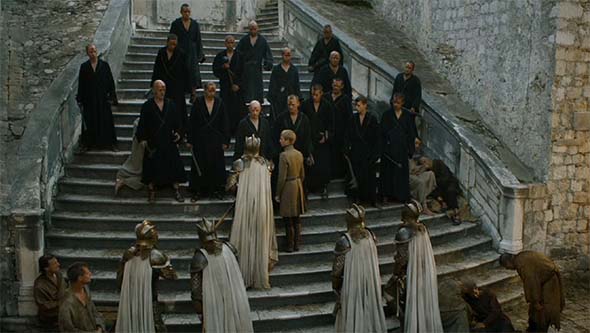
The Lannisters' authority in King's Landing is now being threatened by multiple sources,
including the High Sparrow's cult witch hunts [PICTURED] and the Tyrells and Littlefinger.
CAUTION: THIS POST CONTAINS MAJOR SPOILERS FOR THE FIFTH SEASON [More]
8d5b1285-fb27-4378-b7d3-776660597f94|1|3.0
Tags:Game of Thrones, HBO, Home Box Office, streaming television, Cersei Lannister, Daenerys Targaryen, Tyrion Lannister, John Snow, Jamie Lannister, Ellaria Sand, Ramsey Bolton, Margaery Tyrell, Little Finger, High Sparrow, White Walkers, The Mad King, Aerys II Targaryen
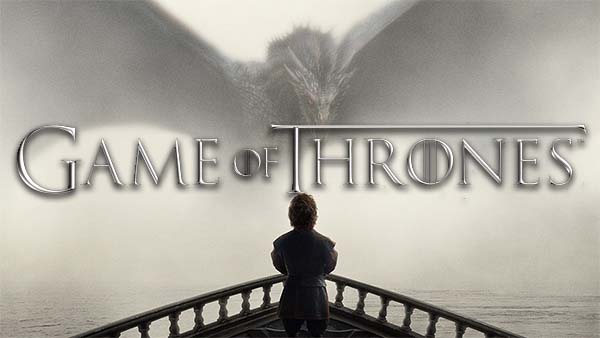
I've been seeing a lot of mixed reaction to the most recent season of HBO's Game Of Thrones (season five). Many sources on the internet have referred to it as the slowest and most boring season of the series so far. And episode six (Unbowed, Unbent, Unbroken) has been reviled as one of the worst episodes of the series due to the sexual assault of poor Sansa. Anecdotally, the people who I know who watch it (including my girlfriend, who got me into the show to begin with) have been disappointed by the apparent uneventfullness of this season. Another friend even said he was likely going to give up on the show completely because he's sick of the show dragging on and then suddenly doing things apparently only for shock value. I think his reaction is a bit extreme.
On the other hand, this season's eighth episode, Hardhome has been received as the best episode of the series so far.
But now that the season is over, and the shocks have been given, it puts the entirety of the season into perspective - at least for me.
The whole of Game of Thrones' fifth season has an over-arching theme of fatalism and futility. And the final episode shifted both of those themes to full-blown self-implosion. Every major character in every theater of operations made very self-destructive choices. And they all suffered for it, and those that survived will continue to suffer into season six. This season also may have shifted long-standing opinions on who are the favored characters and factions, which could be a deliberate attempt to ramp up the tension for a more conflict-filled sixth season.
Season five started with numerous characters and factions at the height of their power. Daenerys, Stannis, Ramsey, and John Snow all had enormous successes at the end of season four and start of season five. The Lannisters may have suffered a severe blow at the end of last season, but their grip on King's Landing was still firm at the start of season five. They all manage to blunder these successes into utter failures by the end of season five.
Probably the most immediately obvious case of self-destruction is Stannis. While most of the season looked as though he was putting himself in a position of strength and was primed to recapture Winterfell, he was also falling victim to the classic Napoleon / Hitler mistake: he tried to invade a tundra empire at the onset of winter. As successful as his actions were in the first half of the season, there was always a feeling of impending dread and desperation hanging over him and his army.
Even those of us who were won over by Stannis' actions at the wall, and his hearftful defense and expression of love for his deformed daughter, must've recognized that he seemed fated to fail.
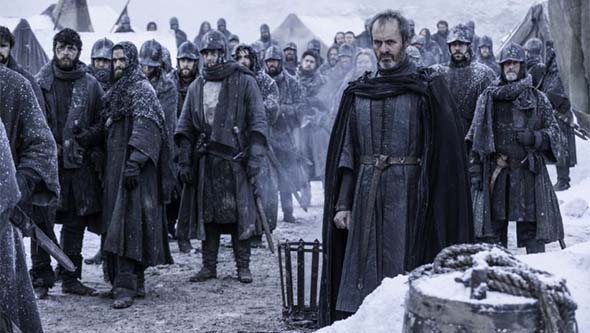
How could anyone follow a man who would do what Stannis has chosen to done?
Stannis cements his doom with quite possibly the worst, and most heartless decision that any character has made in the show to date...
CAUTION: MAJOR SPOILERS AHEAD [More]
9960e026-072e-41f5-a021-7a43834bdc0e|4|5.0
Tags:Game of Thrones, HBO, Home Box Office, streaming television, Iron Throne, Stannis Baratheon, Cersei Lannister, Daenerys Targaryen, John Snow, Arya Stark, Jamie Lannister, Ellaria Sand, Ramsey Bolton, Margaery Tyrell, High Sparrow, White Walkers
|

| 12 | | | | | | | 60 | | 11 | | | | | | | 55 | | 10 | | | | | | | 50 | | 09 | | | | | | | 45 | | 08 | | | | | | | 40 | | 07 | | | | | | | 35 | | 06 | | | | | | | 30 | | 05 | | | | | | | 25 | | 04 | | | | | | | 20 | | 03 | | | | | | | 15 | | 02 | | | | | | | 10 | | 01 | | | | | | | 05 |
|